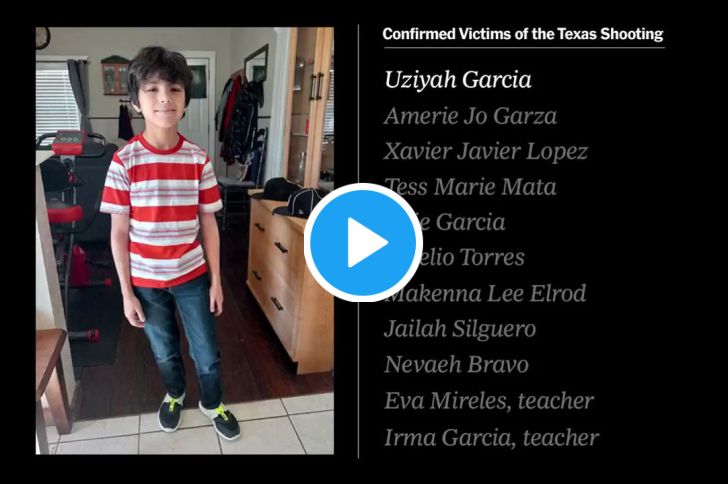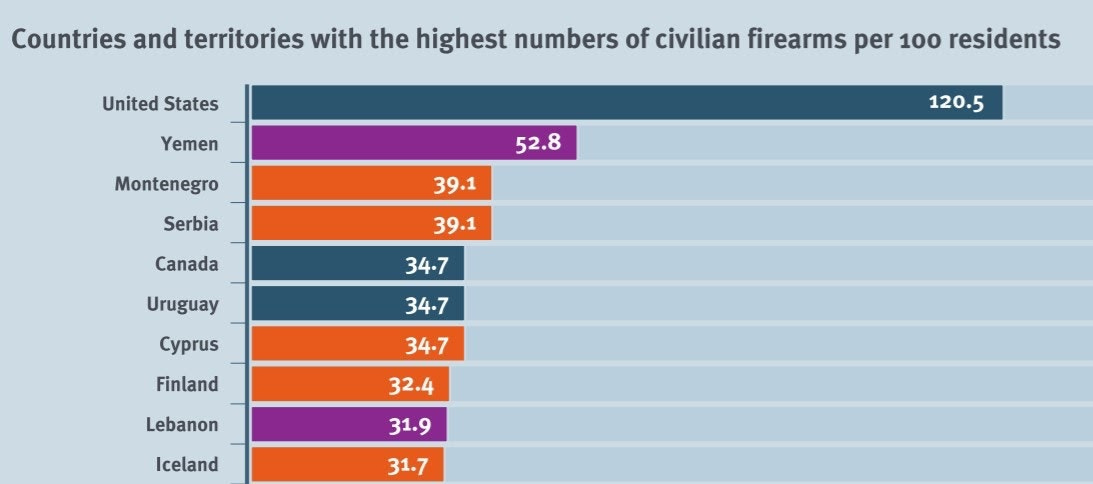Popular Information - 5 facts about guns in America
Welcome to Popular Information, a newsletter dedicated to accountability journalism — written by me, Judd Legum. On Tuesday, an 18-year-old crashed his truck, exchanged fire with police officers, entered an elementary school, and murdered 19 children and two teachers with a semi-automatic rifle. The dead are not statistics. The incident in Uvalde, Texas took place days after another 18-year-old killed 10 people with a similar weapon in Buffalo, New York. In the first 145 days of 2022, there have been 213 mass shootings, defined as an incident where four or more people are shot or killed. "Evil will always walk among us," Texas Lieutenant Governor Dan Patrick (R) said of the massacre. That is true. But only in the United States does evil have virtually unfettered access to military-style rifles. These weapons are not designed for sport or self-defense; they are designed to kill many people very quickly. The Uvalde shooting demonstrates how the law can limit access to guns. The shooter bought a semi-automatic rifle on his 18th birthday, when it became legal for him to do so. If the age limit for purchasing a rifle in Texas was 21, yesterday's massacre may not have occurred. The country could change the catastrophic status quo without infringing on the Second Amendment. Indeed, many such reforms are immensely popular. But a few dozen Republican Senators continue to stand in the way. In the meantime, the death toll mounts. Here are the key facts about guns in America, pulled from Popular Information's previous reporting on mass shootings. There are more guns than people in the United StatesAccording to a 2018 Small Arms Survey, the latest data, there are more civilian-owned firearms in the United States than people, with more than 120 guns for every 100 Americans. The number of guns sold has increased dramatically in recent years. A record 39,695,315 guns were sold to civilians in 2020. By comparison, there were 15 million guns sold in 2011 and 9 million in 1999. 18.9 million guns were sold in 2021, the second-most annual gun sales on record. Remarkably, this spike has occurred as the number of people interested in owning guns has declined. In 1977, more than 50% of all households in the United States owned a gun. By 2018, just 34% of American households reported having a gun in the home. Gun manufacturers have made up for this decline by selling a larger number of more deadly firearms to a smaller number of people. More guns = more mass shootingsA 2018 study of 171 countries from 1966 to 2012 found “firearm ownership rates appeared to be a statistically significant predictor of the distribution of public mass shooters worldwide. Many of the nations in this study that ranked highest in firearm ownership rates also ranked highly in public mass shooters per capita.” The author of the study, University of Alabama professor Adam Lankford, concluded that the "United States and other nations with high firearm ownership rates may be particularly susceptible to future public mass shootings, even if they are relatively peaceful or mentally healthy according to other national indicators.” In other words, the United States has a lot of mass shootings because it has a lot of guns. According to the research, reducing the prevalence of guns might reduce the number of mass shootings in the future. Policies to reduce the number of guns are very popularA 2018 poll by Guns Down America, a gun-control advocacy group, found that 67% of Americans support stricter gun laws. More striking is that overwhelming majorities, including a majority of Republicans, support positions that are often described as out of the mainstream. This includes support for requiring a license to purchase a handgun (89%), a limit on monthly gun purchases (80%), and a voluntary government gun buyback program (79%). These are all provisions that, taken together, could reduce the number of guns in circulation. The poll found that advocating for fewer guns in America is a popular political message. There is also strong support for background checks (94%), and a ban on semi-automatic weapons (78%). The federal government has safety standards for toy guns, but not real gunsNearly every product — from toasters to lawnmowers to teddy bears — must comply with standards set by the government to ensure the item is safe for public use. The Consumer Product Safety Commission (CPSC) regulates household goods and recreational products. The Food and Drug Administration regulates food and prescription drugs. The National Highway Traffic Safety Administration regulates motor vehicles. But there is one category of products that is not regulated for consumer safety by any government agency: guns and ammunition. The Second Amendment has been in place since 1788, but the consumer protection exemption for guns came much later, in 1972. A law passed that year explicitly forbids the CPSC from evaluating the safety of guns. As a result, there "is not a single federally mandated safety standard or child-proofing requirement for firearms made in the United States." The exemption means that the CPSC can regulate toy guns but not actual guns. The agency can mandate a recall of a doll, due to safety concerns, but not a semi-automatic rifle. The gun industry received special legal protections in 2005"Most people don’t realize, the only industry in America, billion-dollar industry, that can’t be sued, exempt from being sued, are gun manufacturers," Biden said in April 2001. That is not precisely true. But Biden is referring to the Protection of Lawful Commerce in Arms Act (PLCAA), signed into law in 2005, which does provide sweeping legal immunity to the gun industry. The PLCAA prevents gun manufacturers from civil liability resulting from "the criminal or lawful misuse" of firearms or ammunition. But there are a few exceptions to the law, including an "action for death, physical injuries or property damage resulting directly from a defect in design or manufacture of the product, when used as intended or in a reasonably foreseeable manner." You can sue a gun manufacturer civilly if the gun malfunctions. But, in nearly every circumstance, you can't sue if the gun functions properly and kills people. Prior to the PLCAA's passage, in 2000, New York City and 30 other localities sued gun manufacturers, alleging the "industry’s selling practices create a public nuisance by allowing guns to be sold in an illegitimate secondary market where they fall into the hands of criminals." Had the lawsuit been successful, the gun industry would have to be much more careful about how firearms are marketed and sold. It could have curtailed firearms that are "designed and marketed primarily for killing people, with military-inspired features and advertising." But the PLCAA was passed to end New York City's lawsuit and others like it. The lawsuits were thrown out of court. While civil litigation has prompted significant reform in the tobacco and pharmaceutical industry, the gun industry is able to continue with business as usual as the body count mounts. The Popular Information newsletter is completely independent. There are no ads, no paywalls, and no corporate overlords. Readers who choose to sign up for a paid subscription make this model possible and keep Popular Information’s accountability journalism free for everyone else. If the cost of this newsletter ($6/month or $50/year) is prohibitive for you, please stay on this free list. But, if you can afford it, consider becoming a paid subscriber right now. |
Older messages
What happens when every patient is a suspect
Wednesday, May 25, 2022
Restrictions on abortions in Texas are interfering with the ability of women to get essential treatment for miscarriages. SB4, a Texas law passed last year, restricts “drug-induced abortion procedures,
The expensive and unscrupulous campaign to keep an anti-abortion Democrat in Congress
Tuesday, May 24, 2022
On September 24, 2021, the House of Representatives passed the Women's Health Protection Act, a bill to codify Roe v. Wade. The bill would preserve abortion rights for millions of women if, as
Major cinema chain brings the Big Lie to theaters nationwide
Monday, May 23, 2022
More than 18 months after the 2020 presidential election, the Big Lie — the discredited claim that Trump won but was the victim of voter fraud — lives on. The Big Lie has staying power because it has
Secrets and lies
Thursday, May 19, 2022
In the last month, Popular Information exposed Ron DeSantis' lies about elementary school math textbooks (prompting the Florida Department of Ed…
The man who could rig the 2024 election
Wednesday, May 18, 2022
Pennsylvania Republicans have nominated State Senator Doug Mastriano to be the next governor. Mastriano is one of the most radical gubernatorial candidates ever to receive a major party nomination.
You Might Also Like
☕ Great chains
Wednesday, January 15, 2025
Prologis looks to improve supply chain operations. January 15, 2025 View Online | Sign Up Retail Brew Presented By Bloomreach It's Wednesday, and we've been walking for miles inside the Javits
Pete Hegseth's confirmation hearing.
Wednesday, January 15, 2025
Hegseth's hearing had some fireworks, but he looks headed toward confirmation. Pete Hegseth's confirmation hearing. Hegseth's hearing had some fireworks, but he looks headed toward
Honourable Roulette
Wednesday, January 15, 2025
The Honourable Parts // The Story Of Russian Roulette Honourable Roulette By Kaamya Sharma • 15 Jan 2025 View in browser View in browser The Honourable Parts Spencer Wright | Scope Of Work | 6th
📬 No. 62 | What I learned about newsletters in 2024
Wednesday, January 15, 2025
“I love that I get the chance to ask questions and keep learning. Here are a few big takeaways.” ͏ ͏ ͏ ͏ ͏ ͏ ͏ ͏ ͏ ͏ ͏ ͏ ͏ ͏ ͏ ͏ ͏ ͏ ͏ ͏ ͏ ͏ ͏ ͏ ͏ ͏
⚡️ ‘Skeleton Crew’ Answers Its Biggest Mystery
Wednesday, January 15, 2025
Plus: There's no good way to adapt any more Neil Gaiman stories. Inverse Daily The twist in this Star Wars show was, that there was no twist. Lucasfilm TV Shows 'Skeleton Crew' Finally
I Tried All The New Eye-Shadow Sticks
Wednesday, January 15, 2025
And a couple classics. The Strategist Beauty Brief January 15, 2025 Every product is independently selected by editors. If you buy something through our links, New York may earn an affiliate commission
How To Stop Worrying And Learn To Love Lynn's National IQ Estimates
Wednesday, January 15, 2025
... ͏ ͏ ͏ ͏ ͏ ͏ ͏ ͏ ͏ ͏ ͏ ͏ ͏ ͏ ͏ ͏ ͏ ͏ ͏ ͏ ͏ ͏ ͏ ͏ ͏ ͏ ͏ ͏ ͏ ͏ ͏ ͏ ͏ ͏ ͏ ͏ ͏ ͏ ͏ ͏ ͏ ͏ ͏ ͏ ͏ ͏ ͏ ͏ ͏ ͏ ͏ ͏ ͏ ͏ ͏ ͏ ͏ ͏ ͏ ͏ ͏ ͏ ͏ ͏ ͏ ͏ ͏ ͏ ͏ ͏ ͏ ͏ ͏ ͏ ͏ ͏ ͏ ͏ ͏ ͏ ͏ ͏ ͏ ͏ ͏ ͏ ͏ ͏ ͏ ͏ ͏ ͏ ͏ ͏ ͏ ͏ ͏ ͏ ͏
☕ Olympic recycling
Wednesday, January 15, 2025
Reusing wi-fi equipment from the Paris games. January 15, 2025 View Online | Sign Up Tech Brew It's Wednesday. After the medals are awarded and the athletes go home, what happens to all the stuff
Ozempic has entered the chat
Wednesday, January 15, 2025
Plus: Hegseth's hearing, a huge religious rite, and confidence. January 15, 2025 View in browser Jolie Myers is the managing editor of the Vox Media Podcast Network. Her work often focuses on
How a major bank cheated its customers out of $2 billion, according to a new federal lawsuit
Wednesday, January 15, 2025
An explosive new lawsuit filed by the Consumer Financial Protection Bureau (CFPB) alleges that Capital One bank cheated its customers out of $2 billion. ͏ ͏ ͏ ͏ ͏ ͏ ͏ ͏ ͏ ͏ ͏ ͏ ͏ ͏ ͏ ͏ ͏ ͏ ͏ ͏ ͏ ͏ ͏ ͏





